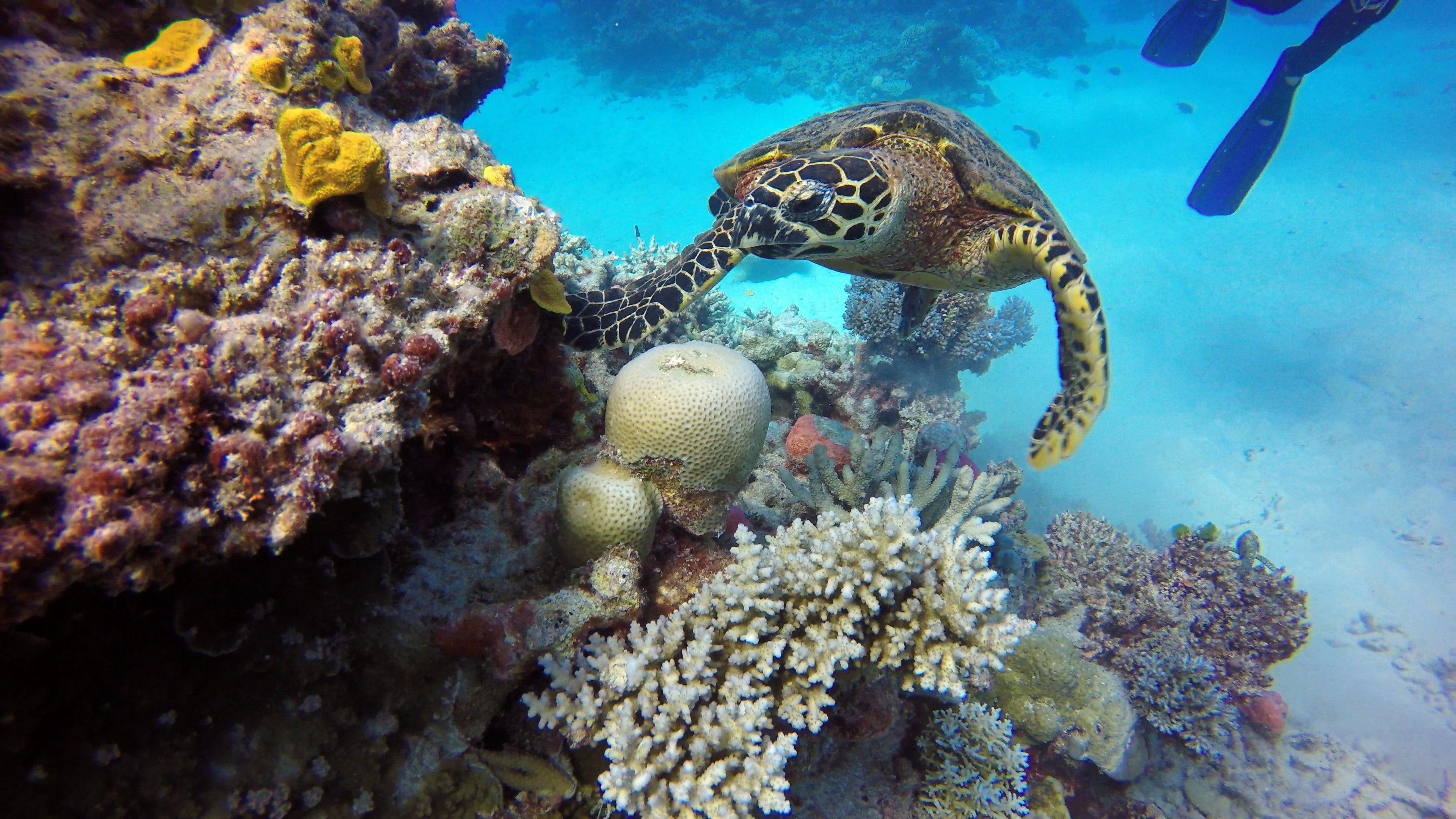As we speak, UNESCO scientists are currently deliberating over whether the Great Barrier Reef should be included on the 'World Heritage In Danger' list. That this is even something that needs to be considered is devastating enough, but after four mass bleaching events in seven years, the truth is undeniable - Scott Morrison's government has recklessly forgone its duty to protect this incredible ecosystem, prioritising big business and development over the safety and security of our natural world.
We are calling on UNESCO and the World Heritage Committee to officially declare the Great Barrier Reef 'World Heritage In Danger'. Please will you sign our open letter.
In our efforts to highlight why this classification is so important, we interviewed Dr. Jodie Rummer, an esteemed marine biologist and Associate Professor of Marine Biology in the College of Science and Engineering at the Australian Research Council (ARC) Centre of Excellence for Coral Reef Studies at James Cook University.
Here are her insights on the current state of the Reef, and what needs to be done.
What are your thoughts on the $1 billion proposed by the federal government for the Great Barrier Reef?
JR: The Federal Government's $1 billion funding for the Great Barrier Reef is earmarked for improving water quality through remediating erosion, improving land condition, and reducing nutrient and pesticide run-off, with substantial funds also for Crown of Thorns Starfish (COTS) control; yet, the number one threat to the reef – climate change – has not been mentioned in this funding package.
We need to do more, faster, to cut emissions this decade, or the reef will face more severe marine heatwaves, more often, and without time to recover. We need to rapidly phase out all coal, oil, and gas dependencies and focus our efforts and funding on renewable, clean energy. Whilst the Australian government has committed to net zero, the data does not suggest this will be achievable well after this century. We need a plan and must execute it now. Climate change is a clear and present danger to Australians and the rest of the planet, threatening our health, safety, livelihoods, infrastructure, economy, and beloved natural spaces. A clean economy is win-win for Australia and for the world. But, to give the Great Barrier Reef its best chance at survival, we must emphasise rapidly cutting greenhouse gas emissions from 2005 levels by 75% this decade and aim for net zero by 2035.

Image from Unsplash
Do you believe the Great Barrier Reef should be declared 'in danger' by UNESCO? If so, why? How would declaring the Great Barrier Reef 'in danger' be of benefit to the Reef?
JR: During the latter part of 2021, UNESCO considered declaring the GBR, as a World Heritage Site, 'in danger'. Yet, after a lot of lobbying against this, UNESCO gave us/Australia some time to report back to them on 1 February 2022 as to how truly serious we are regarding our efforts to reduce greenhouse gas emissions and address the number one problem that the GBR is facing, which is climate change. We have not done this and do not have efforts in place to reduce emissions enough this decade or to reach net zero by 2035. The $1 billion funding that did not address climate change impacts on the GBR further emphasises that the Australian Government is not taking this seriously enough to stave off an 'in danger' listing by the UNESCO World Heritage committee.
If we do nothing to this end, the GBR (and coral reefs worldwide) will face bleaching more frequently and more severely, and predictions suggest annually from 2044 onward. This heat stress will not only be detrimental to the coral but to all of the other organisms that depend on and support the coral reefs (including humans).
While I personally do not want an 'in danger' listing because to me it will emphasise that we, here in Australia, are not doing what we need to do and not setting a good example for the rest of the world, if it is the wake-up call for action that we urgently need right now, so be it.
What can we (everyday people) do to protect the Reef?
JR: First and foremost, we have to vote for clean energy. If we are not of the age to vote yet, we have to urge our parents, aunties, uncles, grandparents, etc. to do so. We also have to do better in our individual, everyday life as well, making clean choices, voting with our dollars, rejecting practices and products that we know are harmful to the environment, including the GBR.

Image by Grumpy Turtle Films.
As a Marine Biologist, what are your thoughts on the projects such as coral seeding, reef stabilisation, the development of heat-resistant coral and climate adaptation work with turtles and other marine species? Does it concern you that these projects seem to focus on adapting to the effects of climate change, rather than addressing the root of all these issues?
JR: As a marine biologist, whilst it is truly amazing and inspiring to witness the technology and innovation today, most of the 'save the reef' projects are – at best – only addressing secondary problems and not addressing the number one problem that the reef and marine ecosystems are facing worldwide, which is climate change. Why can't we use those genius ideas and resources to create a clean economy based on renewables so we can actually reach net zero? It makes no sense to use a huge fleet of vessels, relying on resources from fossil fuels, to go out and whiten the clouds, shade-cloth the reef, kill a bunch of COTS, or pump cool water from the depths. These are small 'bandaids' and cannot work to the scale for the duration that is truly needed to save the reef. For context, the 258 million USD spent so far on coral restoration projects covers ~5 football fields, while the GBR is 70 million football fields in size.
What is the current health/state of the Great Barrier Reef? Is there anything that concerns you in particular or is the largest indicator that we need to take extreme climate action?
JR: The number one threat to the Great Barrier Reef is climate change. Under climate change, the oceans are rapidly heating up, decreasing in pH and oxygen, and making the outlook for coral reefs worldwide, including the Great Barrier Reef, grim.
Already at 1.2 degrees C of global warming, the Great Barrier Reef has suffered three marine heatwaves within five years that resulted in mass coral bleaching and mortality across 98 per cent of the 2300km stretch of the largest coral reef on the planet. Yet, we are barrelling toward warming of more than 2 degrees C, which will be fatal for coral reefs and the organisms, including the humans, that depend on them.
Is there a message that you have for the women, girls and their allies following us about the Great Barrier Reef or a message that you have for Scott Morrison, the Environment Minister or UNESCO?
JR: Emphasising clean energy and completely phasing out fossil fuels is the biggest move we can make to give the GBR (and coral reefs and marine ecosystems worldwide) the best chance at survival.
Indeed, it has never been a more important time to be a marine scientist. And right now, more than ever, we need role models… we need diverse faces, voices, and perspectives in the science that we do. This diversity is crucial, not only for us to find the solutions, but so that our findings can be as accessible and useful as possible and can lead to evidence-based decisions regarding these urgent issues that Australia and the rest of the world are facing.
We would like to thank Dr. Jodie Rummer for taking the time to answer our questions, and provide such valuable insight on the current state of the Reef, and what needs to be done to protect this natural wonder. We strongly encourage you to check out her website for more information on the incredible work that she is doing, and watch her fascinating Ted Talk 'Athletes of the Great Barrier Reef' on YouTube!
The Reef cannot afford to wait, and neither can we. Please will you sign our open letter calling on UNESCO and the World Heritage Committee to officially declare Great Barrier Reef ' World Heritage in Danger'. It is vital that this classification is made, in order to highlight and recognise the severe degradation the Reef has already experienced, and put international pressure on the Australian government to act decisively on climate change.
Read this next: Five walks to save the world – how 'psychogeography' can help you confront the climate crisis
Images provided by Dr. Jodie Rummer and header image by Grumpy Turtle Films.

